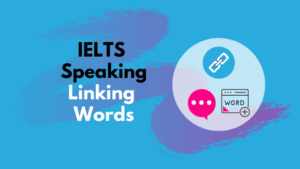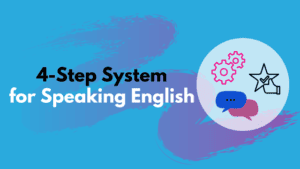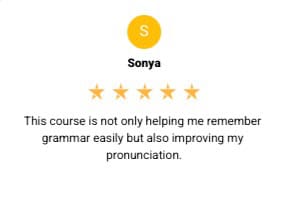IELTS Speaking Part 3: How to Get a High Score
👇 Take this lesson with you! 👇
Do you think it’s easy to get a high score in IELTS Speaking Part 3?
Can you get ideas quickly, find the right words, and speak out fluently with ease?
If not, don’t worry, I have got you covered.
In this lesson, I will give you the secret to getting a high score in IELTS Speaking Part 3
Table of Contents
Getting a high score in IELTS speaking part 3
Of course, there are many things you can do to get a high score, and the most important is to improve your overall level of spoken English.
This includes,
- improving your fluency
- using a wider range of grammar more accurately
- using more vocabulary more accurately
- improving your pronunciation
Now I can hear you thinking,
“Yes, yes, Keith, I know that but that is too general! Give me something a bit more specific”.
Well, whilst there are no shortcuts, there is something very few people are talking about, and for me, it’s essential for IELTS Speaking Part 3.
First of all, hopefully, you know you need to develop your answers in Part 3.
But how do you do that?
The secret for me is all about using HOTS.
No, not high temperatures!
H.O.T.S. stands for Higher Order Thinking Skills
These are critical thinking skills at a higher level, unlike low-level thinking skills, which are things like reciting, repeating, and memorising.
Higher Order Thinking Skills include,
- Analysing
- Reasoning
- Evaluating
- Justifying
- Speculating
And this is exactly what you need to do in Part 3 of IELTS Speaking.
A sample IELTS speaking part 3 answer
Imagine the examiner asks you the following question,
Should we let children use mobile phones?
It’s not enough to say,
I think so, yes, that’s a good idea!
You also need to reason, synthesise ideas, evaluate, and even possibly speculate on the future.
In short, you need to be using HOTS.
You might say something like this,
I’d say so, yes, because for one, they can help children do their homework better, on top of that, they can help keep children safe.
Of course, students can be distracted by social media on phones, and that’s a hugely important issue we need to address, but mobile learning is going to become more popular and so we need to move with the times.
In this sample, I answer first by reasoning (because) and synthesising ideas ( for one, on top of that).
Then I evaluate an idea (that’s a hugely important issue).
Finally, I speculate (is going to become).
Using functions in IELTS speaking part 3
So, HOTS are the thinking skills you need, but of course, you need the words and phrases in English to do this.
When we focus on the English needed to express these skills, we often call them functions.
In this lesson, we will look at the following functions which relate directly to Higher Order Thinking Skills,
- Giving opinions
- Reasoning
- Justifying
- Evaluating
- Speculating
I will show you simple and complex phrases. In IELTS Speaking, you need to use both simple and complex language. Don’t think that everything needs to be complex. That is not how native speakers speak.
In addition, I will highlight which kind of questions will probably produce which functions.
Giving Opinions
So, this is a fairly simple function and a good place to start. Common questions in IELTS Speaking Part 3 that might be answered with this function are
- Do you think ______?
- Do you agree that ____?
- Is it a good idea to ____?
Useful phrases
- I think that ____
- I think so,____
- I reckon that ____
- Based on my experience ____
- It seems to me that ____
Do you agree that books are better than films?
Based on my experience, the book is usually better than the film. Directors often give a narrow interpretation of the story and it’s hard to capture the spirit of the original book.
Giving Reasons
Questions in IELTS Speaking Part 3 that might be answered with this function are
- Why is ______ so popular?
- Why do some people ______?
Useful phrases
- It’s because…
- The main reason is ____
- There are a number of reasons, firstly _____
- It (all) boils down to ____
- One cause could be ____
Note: It boils down to something = something is the most important thing.
Why do parents let their children use the Internet at such a young age?
It all boils down to time, parents are too busy to look after their kids and so use the Internet as a kind of baby-sitter!
I reckon the main reason is parents are too busy to look after their kids and so use the Internet as a kind of baby-sitter!

Justifying
Typical IELTS Speaking Part 3 questions that might be answered with this function are
- Why is ______ so popular?
- Why do some people ______?
Useful phrases
- I think this is true because _____
- This seems to be the case because ____
- This is down to the fact that ______
- The reason I think so is _____
Why do young people like studying in a coffee bar rather than at home?
I’d say this is down to the fact that coffee bars can provide a relaxing atmosphere that’s conducive to better study, at least this seems to be the case because chain stores like Starbucks with their comfy sofas and soft music, are full of students studying.
Evaluating
Some questions that might be answered with this function are
- How important is _____?
- How useful is ____?
- What are the advantages and disadvantages of ____?
Useful phrases
- It’s important
- I think this is hugely important
- I think this is extremely useful
- This is critical
- It’s not as important as you may think, ____
How important is tourism in your country?
I think this is hugely important, in recent years the pandemic has led to fewer visitors coming to my country and this has really impacted the local economy.

Speculating
Some common Part 3 questions that might be answered with this function are
Will we ______ more in the future?
How will ______ change in the future?
Useful phrases
It will ____ (to express certainty)
It might ____ (to express possibility)
It could ____ (to express possibility)
It may ____ (to express possibility)
It may be that ____ (to express possibility)
It might well ____ (to express strong possibility)
It’s highly likely that ____ (to express high probability)
Will books disappear in the future?
They might well disappear given the popularity of e-books, but that said, I think so many people still enjoy flipping the pages of real books, that it is highly likely that we will have both paper books and e-books in the future
Conclusion
- To get a high score in IELTS Speaking Part 3, you need to develop your answers, connecting your ideas in a fluent and coherent way.
- A great way to do that is to use phrases that express different functions.
- The most useful functions in IELTS Speaking Part 3 are the ones connected to Higher Order Thinking Skills.
- Watch the video above again, and start practicing using these functions.
- If you are working with a speaking partner below there is a useful list of IELTS Speaking Part 3 topics and questions you can ask each other.
Remember, there is no shortcut!
Practice and build flexibility over time, and most of all, have fun!
If you liked this lesson, leave a comment below.
If you want to see more functions in action, try the following links
Comparing and contrasting
Agreeing / Disagreeing
Improve your Speaking Skills with this Free Course
Crack IELTS Speaking Part 1
Learn to Speak with Confidence in Part 1 of Your IELTS Test!
⭐️⭐️⭐️⭐️⭐️
‘It’s such a great course. I’ve learned so many usages for speaking part 1.’
Zu Htet






8 thoughts on “IELTS Speaking Part 3: How to Get a High Score”
This is highly useful and effective, I would like to thank you professor for your efforts.
Thanks, I am glad you like the article.
Pingback: Advanced Vocabulary for IELTS Speaking - Powerful phrases!
Gorgeous
Thanks!
It’s extremely useful for my IELTS speaking. Thanks for sharing.
My pleasure and glad it’s useful!
Pingback: IELTS Speaking Part 3: How to Get a High Score – IELTS TEST – how to prepare?